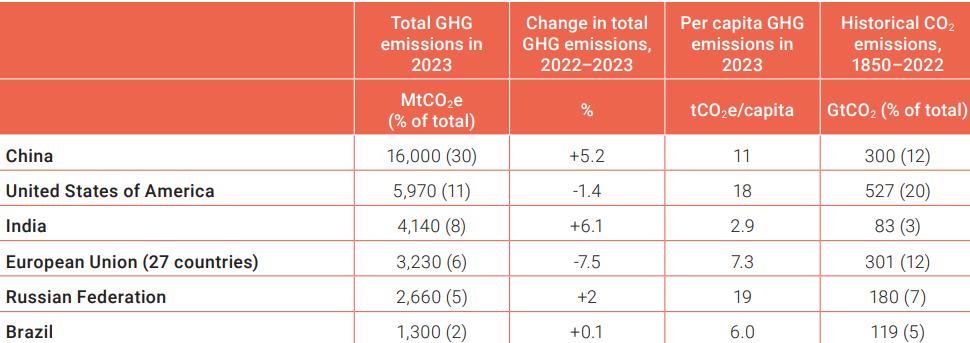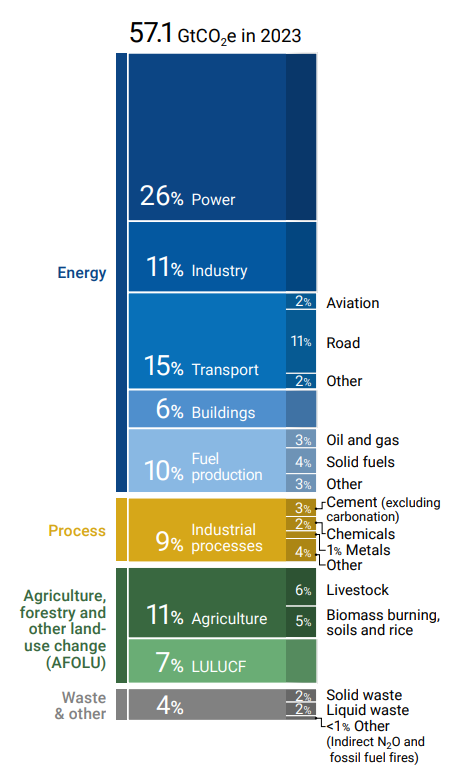Emissions Gap Report 2024 | 28 Oct 2024
Why in News?
Recently, the United Nations Environment Programme (UNEP) released the Emissions Gap Report 2024 ahead of the COP 29 of the UNFCCC meeting in Baku, Azerbaijan.
What are Key Highlights of the Report?
- Current Trajectory: The report highlighted that if countries maintain current environmental policies, global temperatures will likely rise by 3.1°C above pre-industrial levels.
- Paris Agreement at Risk: Full implementation of all Nationally Determined Contributions (NDCs) would still lead to 2.6°C of warming.
- The Paris Agreement target is to keep the global temperature rise well below 2°C above pre-industrial levels, with an effort to limit it to 1.5°C.
- To limit global warming to 1.5°C, greenhouse gas emissions must peak before 2025 at the latest and decline 43% by 2030.
- Record High Emissions: Global greenhouse gas emissions hit 57.1 gigatons of CO₂ equivalent gases (tCO₂e) in 2023.
- India’s emissions grew by 6.1% while overall global emissions rose by 1.3% in 2023 compared to 2022.
- Major Emitters:
- G20’s Contribution: G20 countries (excluding the African Union) contributed 77% of global emissions in 2023.
- High Emissions from Key Players: Six of the largest emitters accounted for 63% of emissions globally.
- Per Capita Emissions:
- India’s per capita GHG emissions in 2022 were 2.9 tCO₂e, significantly lower than China (11 tCO₂e) and the US (18 tCO₂e).
- Developed countries have per capita emissions about three times the global average (6.6 tCO₂e), while India, African Union, and least developed countries remain below it.
- Necessary Emissions Cuts: A reduction of at least 7.5% each year until 2035 is essential to keep the 1.5°C target within reach.
- Cost of Bridging the Gap: Achieving net-zero by 2050 requires USD 900 billion to USD 2.1 trillion annually, or about 1% of global GDP.
- Emission Reduction Pathways:
- Scaling solar and wind energy can deliver 27% of required emissions reductions by 2030.
- Forest conservation and restoration could account for around 20% of reductions.
About United Nations Environment Programme (UNEP)
- Established: Founded in 1972, following the United Nations Conference on the Human Environment in Stockholm.
- Headquarters: Nairobi, Kenya.
- Governing Body: The United Nations Environment Assembly (UNEA) is the governing body of UNEP.
- UNEA is the world’s highest-level decision-making body for matters related to the environment, with a universal membership of all 193 Member States.
- Programs and Initiatives: Runs major initiatives, including the Climate Action, Ecosystem Restoration, Clean Seas, and Sustainable Development Goals (SDGs) support.
- Reports: Publishes influential reports like the Emissions Gap Report, Global Environment Outlook, and Adaptation Gap Report to guide global policies.
UPSC Civil Services Examination Previous Year Question
Prelims
Q. The ‘Common Carbon Metric’, supported by UNEP, has been developed for
(a) assessing the carbon footprint of building operations around the world
(b) enabling commercial fanning entities around the world to enter carbon emission trading
(c) enabling governments to assess the overall carbon footprint caused by their countries
(d) assessing the overall carbon foot-print caused by the use of fossil fuels by the world in a unit time
Ans: (a)
Q.“Momentum for Change: Climate Neutral Now” is an initiative launched by (2018)
(a) The Intergovernmental Panel on Climate Change
(b) The UNEP Secretariat
(c) The UNFCCC Secretariat
(d) The World Meteorological Organisation
Ans: (c)
Q. With reference to an initiative called ‘The Economics of Ecosystems and Biodiversity (TEEB)’, which of the following statements is/are correct? (2016)
- It is an initiative hosted by UNEP, IMF and World Economic Forum.
- It is a global initiative that focuses on drawing attention to the economic benefits of biodiversity.
- It presents an approach that can help decision makers recognize, demonstrate and capture the value of ecosystems and biodiversity.
Select the correct answer using the code given below:
(a) 1 and 2 only
(b) 3 only
(c) 2 and 3 only
(d) 1, 2 and 3
Ans: (c)


